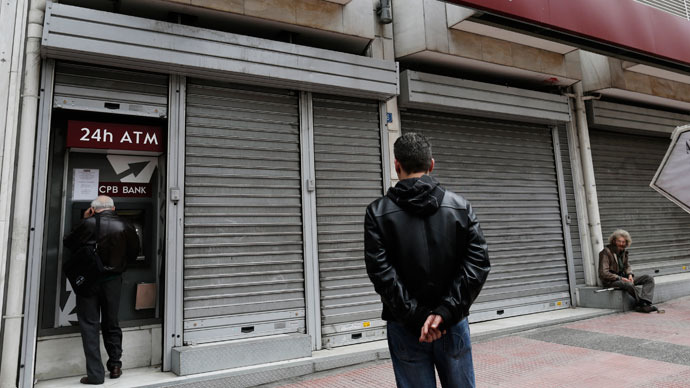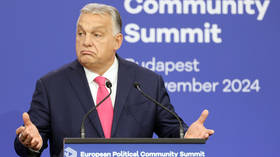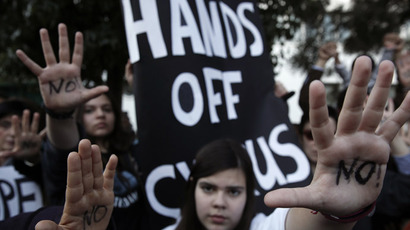Emergency legislation looms as Moscow refuses aid to Cyprus

Cyprus's ruling party says a solution to the bailout crisis within the EU rules may be possible within "the next few hours." The much-debated levy on Cypriot bank deposits is "clearly on the table," according to the country's Finance Minister.
"I think that [levy on bank deposits] is clearly on the
table, that is something that needs to be discussed to see whether
a levy on deposits of some sort ... would make a contribution to
finalising the package," Finance Minister Michael Sarris has
said. The parliament is due to adopt new emergency legislation to
secure the EU bailout after Russia said it would not help.
"There is cautious optimism that in the next few hours we may be
able to reach an agreed platform so parliament can approve these
specific measures which will be consistent with the approach, the
framework and the targets agreed at the last Eurogroup," the
deputy leader of the Cyprus's ruling Democratic Rally party Averof
Neophytou said on Friday, Reuters reports.
Nicosia introduced emergency legislation to parliament late on
Thursday to secure a bailout deal with international creditors as
the island state faces an ultimatum from the ECB to agree on the
bailout by next week.
The parliament is to debate on the emergency legislation on Friday, as MPs say they needed time to consider the new legislation.
The bills presented include plans to recapitalize its banking sector, eight times the size of Cyprus’ €17 billion economy, and lay losses on big depositors. The finance minister and Cyprus Central Bank are granted emergency powers to introduce any restrictive measures on banking activities to stop money flooding out of the Cypriot banks when they reopen next week after 10 days’ holiday.
Cyprus Central Bank governor Panicos Demetriades told reporters Thursday that “the banking system needs restructuring otherwise it will go bankrupt and it needs to be done immediately.”
This includes restructuring Cyprus’ second-largest lender, Popular Bank (Laiki).
Laiki would therefore be split into a ‘good’ and ‘bad’ bank. The
larger savings accounts would reportedly be placed in the ‘bad’
bank and face losses of up to 40%.
“Otherwise, Laiki Bank will be led to immediate bankruptcy and
termination of its operations, with catastrophic consequences for
the workers, the depositors in their entirety, our banking system
and the country’s economy,’’ Demetriades said.
He added that small deposits under €100,000 would be guaranteed and bank jobs would be safeguarded.
Within the new plan Cyprus government also considers creating an "investment solidarity fund" to accumulate €5.8 billion required to secure the EU bailout.
In the meantime people in Cyprus capital of Nicosia are queuing
in front of cash machines. Late on Thursday people staged protests outside the government building after
Laiki imposed a €260 limit on cash withdrawals.

From Moscow with empty hands
Cyprus hoped to get help from Russia. However, the two-day negotiations between Cyprus's finance minister and his Russian counterpart failed to provide anything tangible. Michalis Sarris left Moscow empty-handed on Friday after Russia said it would not help out Cyprus before it agrees a bailout deal with the EU.
Russia has not withdrawn from efforts to settle Cyprus' problems, said Prime Minister Dmitry Medvedev on Friday.
"Concerning our involvement in the process, we have not closed the door. We did not say that we would not discuss anything any more, or that we don't want to listen to anyone, or that Cyprus is a member of the European Union and leave us alone," Medvedev said at a joint press conference with European Commission President Jose Manuel Barroso.
According to Medvedev Russia has "clearly understandable economic interests in Cyprus." "But we will be ready to discuss various ways of supporting Cyprus - the more so since we did provide support, a loan - after a final scheme is negotiated by the European Union and Cyprus."
It's been reported Cypriot Finance Minister Michael Sarris has
been asking for a $5 billion loan, but had no luck there.
"It's been out of the question because the EU has set a limit
for debt Cyprus should not go over, and this particular loan was
above this limit," Russia's Finance Minister Anton Siluanov
said on Thursday.
However Russia did offer a helping hand earlier this week when
Russia’s energy major Gazprom allegedly made a private bailout
offer to Cyprus according to the New York Times on Wednesday. The
island was offered the money needed to keep it afloat by selling
Gazprom exploration rights to offshore gas deposits in the
Mediterranean. Gazprom however refused to comment on the news or
even confirm it made such an offer. Michael Sarris has denied there
was such an offer, but he did identify the divided island's
offshore gas riches as one area in which Russia could invest.
It didn't take long for Cyprus's neighbor Turkey to react to the
news. On Thursday Ankara said it would challenge any move by Cyprus
regarding offshore gas exploration.
"This resource belongs to two communities and the future of this
resource can't be subject to the will of southern Cyprus alone.
(We) may act against such initiatives if necessary," one of the
Turkish officials told Reuters.
But Russia's help in bailing out Cyprus would only speed up the
country's demise by undermining its value as a banking center,
political expert Sergey Karaganov believes.
“I don’t think we should be involved in bailing out Cyprus
because if we start to bailout Cyprus it will be expensive. And we
must understand that if we want to eventually get a gas field,
which is a big question, and the resort – well it’s worth it, but
then we should take into consideration the bill. If we bailout
Cyprus against Europe, against the World Bank, and the
international financial system, it will cease to exist as a banking
center, which is the main value of Cyprus internationally,”
Karaganov told RT.
Earlier on Thursday the ECB gave Cyprus till next Monday to accumulate
the money to secure an international bailout. Otherwise the bank
said it will pull out of the negotiations and step aside. Hence
Cyprus will face a collapse of its weary financial system and could
even be forced out of the euro currency zone.














